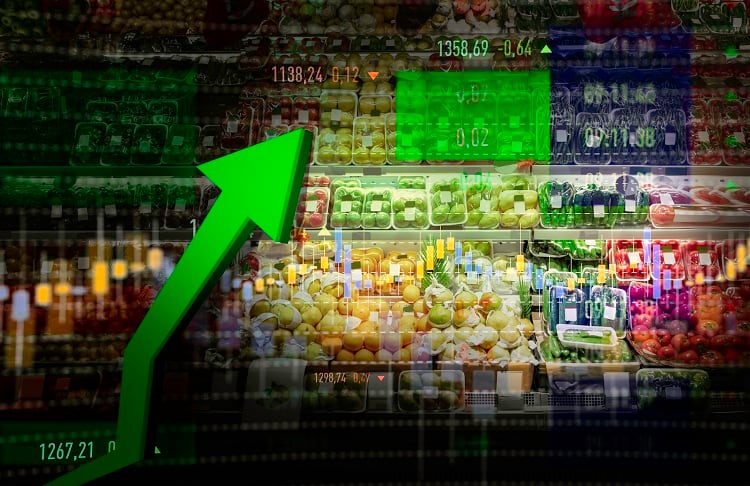Consumer trust is essential to the survival and success of a brand, so the news that consumer trust in the food industry is declining will come as unwelcome news for producers, manufacturers and retailers. But why is trust in the food industry declining and what can be done to get it back?
Why is trust in the food and beverage industry declining?
A recent report by the EIT Food Consumer Observatory, looked at the views of 19,642 consumers across 18 European countries, finding that just 53% are confident that the food they eat is safe. Furthermore, there are trust issues with regards to the operating practices of brands. The first of these being the question of sustainability. In fact, only 36% of the consumers surveyed believe that the food they eat is sustainable.
Sustainability has become a major concern for food manufacturers and consumers as the future of food security relies heavily upon it.
"What we eat, and how that food is produced, affects our health but also the environment,” said a spokesperson for the United Nations (UN). “Food needs to be grown and processed, transported, distributed, prepared, consumed, and sometimes disposed of. Each of these steps creates greenhouse gases that trap the sun’s heat and contribute to climate change. About a third of all human-caused greenhouse gas emissions is linked to food.”
It’s believed that this diminished trust in the food industry’s dedication to sustainability could be fuelling the current decline in consumer motivation to lead a sustainable lifestyle. According to the report, 78% of consumers surveyed in 2020 reported that they intended to live a sustainable lifestyle, but that figure has since dropped to 71% today.
“The food sector has faced unprecedented challenges in recent years and will continue to do so as climate change takes its toll on food production,” says Sofia Kuhn, director of public insights and engagement at EIT Food. “Now, more than ever, we need partnership between the food sector and Europe’s citizens if we are to create a healthier and more sustainable food system for everyone.”
Another cause for concern for consumers, and a reason that their trust is being eroded, is that only 44% believe the foods they are consuming are healthy.
This is in conjunction with the fact that consumer efforts to eat healthily has also been declining over the past few years, resulting in just 56% now reporting that they aim to eat a healthy diet. It also follows the pattern of sustainability, with consumers appearing to follow the lead of the food industry, so when trust is low, motivation is similarly low.
The next issue will likely prove the most concerning to the food industry as it’s a lot more difficult to address. And that is a lack of consumer trust in the overall food sector in terms of the competency, openness and care of food sector actors.

Digging deeper, we find that farmers remain the most trusted group in the food sector, with 65% of consumers expressing trust in them. Furthermore, 67% of consumers believe that farmers are doing a good job. However, just 53% of consumers believe that farmers demonstrate that they care about consumers and act in the public interest.
Retailers are the second most trusted group, followed by restaurants and caterers, with food manufacturers sitting at the bottom of that list, alongside authorities (government agencies at national and EU level). In fact, a mere 46% of consumers surveyed say that they trust food manufacturers and 45% trust authorities. And, perhaps even more damning, is the fact that 27% of consumers actively distrust food manufacturers.
Meanwhile only 38% of consumers believe that food manufacturers care about people’s concerns, while just 37% feel that they are open and honest about how they prepare and sell food.
This all paints a fairly bleak picture for food manufacturers, and the food industry in general, showing they have some serious work to do if they want to win back consumer trust.
“Consumers need to be able to trust that the food they eat is both good for them, and good for the planet,” says Klaus Grunert, professor of marketing at Aarhus University and lead of the Consumer Observatory. “If we are to support people to make long-term changes to how they eat, we need the food sector to work with consumers to provide better information, options and access for diets that are healthy, nutritious and sustainable – while being affordable and inclusive for everyone.”
What can be done to restore consumer trust in the food and beverage industry?
The report shows little in the way of good news for the food industry with regards to consumer trust, so how can it improve its reputation?
“At the heart of this is the need for the food system to improve its openness, and consumers must trust that actors are acting in the public interest,” says EIT Food’s Kuhn.
Communication is a major factor here and if there’s one thing the food industry is willing to spend on, it’s marketing. According to the University of Connecticut, food, beverage and restaurant companies spend almost 14 billion USD per year on food advertisements in the United States. Though we don’t have the figures for food, beverage and restaurant companies in Europe, the marketing spend across all industry sectors in Europe is forecast to surpass 148 billion USD in 2024, according to business intelligence platform, Statista. There is, therefore, marketing budget available to communicate effectively with consumers in a way that they not only understand but believe to be honest and trustworthy.
Other factors, such as the health implications of consuming ultra-processed foods, continue to cause confusion for consumers, so finding ways to effectively communicate these are essential.
Similarly, the subject of sustainability is one which the report highlighted as an area in which consumers lack trust.
“We need to understand and work with consumers to foster trust and engagement in embracing food innovations and making conscious choices about what to eat,” adds Kuhn.
Food labelling is another contentious issue, with behaviours such as 'shrinkflation' (making a product smaller whilst keeping the price the same), upsetting consumers. Some countries have begun to address this, with France recently announcing it's plans to improve transparency, where 'shrinkflation' has been implemented. Whether other countries will follow suit remains to be seen but it would likely help to restore consumer trust.





